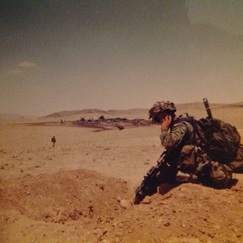|
In 2002, I deployed to Afghanistan with the 3rd Battalion Princess Patricia’s Canadian Light Infantry Battle Group. In the aftermath of 9/11 and as part Operation Enduring Freedom in Afghanistan, our Battle Group got sent to Kandahar, a largely barren environment near the Registan desert. Our uniforms were green (we hadn’t been issued desert camouflage) and we stood out.
|
So what did a bunch of grunts do in this situation? Exactly what the infantry has done for hundreds if not thousands of years – improvise, adapt and overcome. If we weren’t going to be issued desert camouflage, we’d make our own and many soldiers simply painted their gear with beige and tan spray paint.
The chain of command could have been upset at this turn of events; we were after all defacing government property. Instead, the commanding officer, then Lieutenant-Colonel Pat Stogran, was impressed. He’d asked us to use our initiative and in his mind, we’d done that in spades, doing what we needed to do to ensure our safety while demonstrating we understood the basics of personal camouflage.
Now, before someone starts pointing out holes in the analogy (did we really need cam paint on our faces in Tora Bora?), the important part is that being good at the small things normally makes it much easier to be good at the big things. So how does this apply to writing? Easy – we just need to identify what the basics of writing are.
There are many opinions on this, but as for me, I’ll take the word of the master, Mr. Stephen King, who says there are two basics to being a writer: reading and writing. And how do you get brilliant at these basics? Simple: read a lot and write a lot.
|
Read a lot. Immerse yourself in your craft, it really doesn’t get any easier than this. You don’t need to have a master five year plan of what to read, but read something and be reading all the time. Challenge yourself, read books you normally wouldn’t, read in and out of genre. From my limited experience, reading in genre is hugely important, especially when you eventually write a query letter. It’s pretty hard to highlight comparison titles if you’re ignorant of what’s out there. Bottom line, Mr. King says it best in his book, On Writing: A Memoir of the Craft, “If you don’t have the time to read, you don’t have the time (or the tools) to write. Simple as that.”
|
Write a lot. A lot is subjective, but it’s probably more than fifteen minutes once a week. Most guides for beginning writers suggest incorporating writing as a daily practice and I’d vouch for that. It doesn’t need to be for hours on end at the start, in fact starting out with a small amount, even 10 minutes, is probably more likely to develop into a habit. Whatever it is, do it every day. No different than physical exercise, you need to use it or lose it and just like starting up running after a month off feels like work (yes, I realize for some people that running always feels like work…) so too will writing if you take time off.Simple, right? Two easy things from a master that will help you become a better writer. But make no mistake, whether you apply Gladwell’s 10,000 hour rule or some other metric, mastering the basics is a long slog, arguably a lifelong journey. I know I’m just getting started and while some days doing the basics seems pretty hard, the writing adventure is similar to all journeys in that it has to start somewhere.
When it does, it progresses at the same pace as everyone else’s. To quote Mr. King, “One word at a time.”

